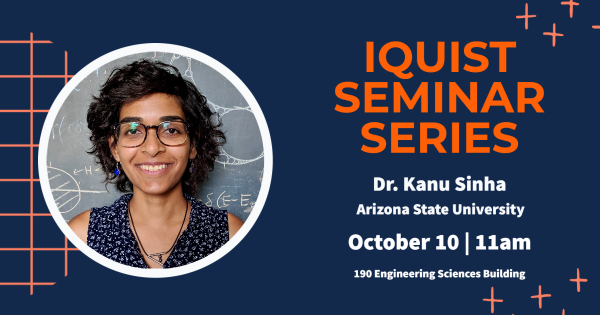IQUIST Seminar: "Atom-Field interactions in Nanoscale Quantum Optical Systems," Kanu Sinha, Assistant Professor, Arizona State University

- Sponsor
- IQUIST
- Speaker
- Kanu Sinha, Assistant Professor, School of Electrical, Energy and Computer Engineering, Arizona State University
- Contact
- Hannah Stites
- hstites2@illinois.edu
- Phone
- 217-300-4072
- Views
- 325
- Originating Calendar
- IQUIST Seminar Series
Atom-Field interactions in Nanoscale Quantum Optical Systems
Abstract: Interactions between atoms or atom-like emitters and electromagnetic fields are at the heart of nearly all quantum optical phenomena and quantum information applications. With growing efforts towards miniaturization – both with the fundamental motivation to explore strong light-matter coupling regimes and the practical goal of making quantum devices more modular – understanding and controlling atom-field interactions at nanoscales becomes increasingly relevant. When interfacing atoms with surfaces of waveguides and photonic structures at nanoscales, quantum fluctuation phenomena such as Casimir-Polder forces, surface-modified dissipation and decoherence become an inevitable element of consideration. I will present an overview of various ways to engineer fluctuation-induced phenomena in nanoscale quantum optical systems, and discuss how collective effects can modify Casimir-Polder forces.
Furthermore, when connecting multiple atoms at long distances, memory effects of the electromagnetic environment become pronounced in the presence retardation, necessitating a non-Markovian treatment of the system. I will discuss retardation-induced modifications to collective atom-field interactions in distant correlated emitters coupled to a waveguide. We demonstrate that such a system can exhibit surprisingly rich non-Markovian dynamics, with collective spontaneous emission rates exceeding those of Dicke superradiance (`superduperradiance'), formation of delocalized atom-photon bound states and directional routing of photons guided by atomic correlations. We also demonstrate spontaneous entanglement generation between two distant quantum emitters in the presence of retardation, as the non-Markovian time-delayed feedback synchronizes the emitters into an entangled dark state. These results are pertinent to building long-distance quantum networks and distributed quantum sensing protocols.
Bio: Kanu Sinha is an Assistant Professor at the School of Electrical, Computer and Energy Engineering at Arizona State University since 2022. Prior to her appointment at ASU, she was an Associate Research Scholar at the Department of Electrical and Computer Engineering at Princeton University. She earned her Bachelor of Technology degree in Engineering Physics at the Indian Institute of Technology (IIT), New Delhi, followed by her Ph.D. in Physics at University of Maryland (UMD), College Park. She has since been a postdoc at the Institute of Quantum Optics and Quantum Information (IQOQI) in Innsbruck, Austria and at the US Army Research Laboratory (ARL) in Maryland. Her research is at the intersection of quantum optics, quantum information and open quantum systems – with a focus on fluctuation phenomena, collective atom-field interactions and non-Markovian open quantum systems. While primarily a theorist, she collaborates closely with ongoing experiments with cold atoms coupled to optical nanofibers, solid-state quantum optics, and levitated nanoparticles.
To watch online go to the IQUIST YouTube channel: https://www.youtube.com/channel/UCCzAySwQXF8J4kRolUzg2ww